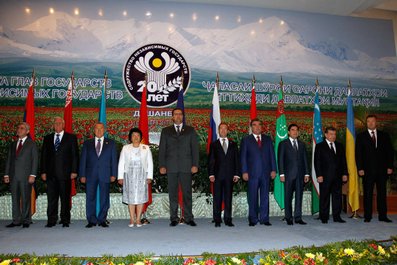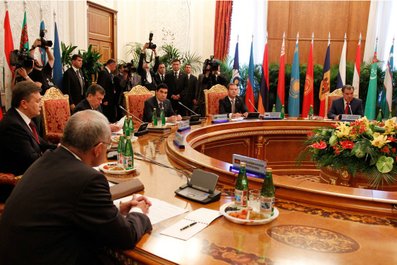Anniversary CIS Summit: plans of institutional changes
 On September 3 in Dushanbe (Tajikistan) took place the latest summit of the Commonwealth of Independent States (CIS), that celebrated its 20th anniversary.
On September 3 in Dushanbe (Tajikistan) took place the latest summit of the Commonwealth of Independent States (CIS), that celebrated its 20th anniversary.
During the meeting, the high-ranked officials of two sub-regional groupings of the post-Soviet states - the Customs Union of the Eurasian Economic Community (Russia, Belarus and Kazakhstan) and the Organization of Collective Security Treaty (Armenia, Russia, Belarus, Kazakhstan, Kyrgyzstan, Tajikistan and Uzbekistan) - announced the plans of institutional reforms of these two organizations, changing their decision-making procedures towards a greater role of supranational institutions and lower consensus requirements.
 In the Organization of Collective Security Treaty(OCST), it is planned to define a set of decisions, which could be made by the qualified majority voting (currently consensus is the only decision-making mechanism); of seven members of the organization, six are claimed to agree with the proposal.
In the Organization of Collective Security Treaty(OCST), it is planned to define a set of decisions, which could be made by the qualified majority voting (currently consensus is the only decision-making mechanism); of seven members of the organization, six are claimed to agree with the proposal.
In the EurAsEC Customs Union, the qualified majority is already partly implemented as a decision-making mechanism, so the reforms ought to influence the main executive body of the organization, the Commission. While currently the Commission consists of three deputy prime ministers of the member countries, it is planned to create another decision-making body within the Commission, consisting of ten members focusing on specific functional areas (e.g. competition) without clear ties to their home countries (although the members are expected to have past experience of work as members of the national governments, they will not hold any position in the national councils of ministers during their mandate in the Commission). Thus, the Commission is likely to shift from an intergovernmental into a supranational decision-making body.
Alexander Libman, Frankfurt School of Finance and Management, Germany, for IDW - 20 September 2011
